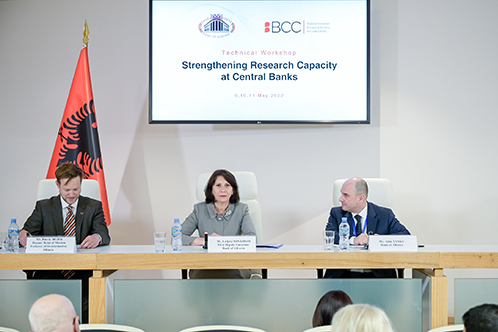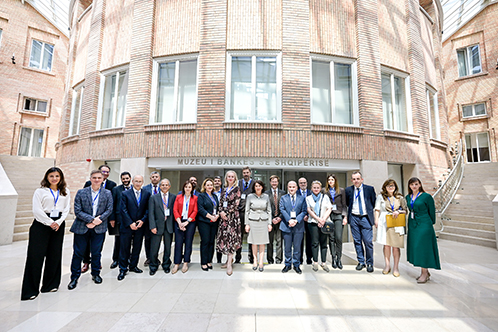BANK OF ALBANIA
PRESS RELEASE
Bank of Albania and SECO co-organise the Workshop on “Strengthening research capacity at central banks”
Publication date: 09.05.2022
On 9-11 May 2022, the Bank of Albania co-organises with the State Secretariat for Economic Affairs (SECO) the Workshop on “Strengthening research capacity at central banks.”
The goal of the activity is to share experiences in the field of scientific research among participants of central banks from countries partnered with the BCC programme (Bilateral Assistance & Capacity Building for Central Banks)[1], such as: Azerbaijan, Bosnia and Herzegovina, Columbia, Morocco, Peru, Tunisia, Ukraine and Albania.

The workshop will be organized in separated/dedicated sessions, which will cover a variety of issues, focusing mainly on the economic, political and academic debates in the field of economy, finance and central banking.
The research papers to be presented in this workshop reflect the opinions and discussions of the researchers, who are experts on crucial central banks issues. These papers will include the research carried out by the Bank of Albania coupled with the one research carried out by other central banks and the academic world.
The workshop proceedings were opened by the First Deputy Governor of the Bank of Albania, Ms Luljeta Minxhozi, and the Deputy Head of the Swiss Embassy in Tirana, Mr. Patrik Meier.

The First Deputy Governor Minxhozi stated that after a decade of cooperation between the Bank of Albania and SECO through the BCC programme, we are convinced that this programme has contributed to enhancing the research capacity at the central bank through the necessary academic trainings, conferences, as well as the technical and the provided research assistance.
Ms Minxhozi commended the proceedings of the workshop, which will serve as a platform to exchange best practices and benefit from the rich experience of conducting a high-standard research. The focus of this research will be adapted to the important decisions and policies of central banks.
Further, the Deputy Governor stated that the improvement of research capacities that contribute in fulfilling the objectives provided for in the law that regulates central banks, is an issue of high significance. Research capacities may contribute to inform and support the decision-making process of central banks. For this purpose, central banks may notice how applied research can cope with issues related particularly to themes on monetary policy and financial stability.
Concluding, Ms Minxhozi thanked SECO for the continuous support offered in this field, as well as the participating central banks for sharing their best practices.
Next, moderating the proceedings of this workshop was Mr Marko Škreb, the former Governor of the Central Bank of Croatia, and Adviser with a long-standing experience in a series of central banks in emerging economies. During this activity, important topics were discussed, such as: the role of scientific research and the organisation of this process in central banks; the method of selecting topics to be explored in the scientific study; indicators for measuring and evaluating the research product; strategies for improving research quality; new challenges of central banks in the field of scientific research (related to virtual currencies, climate changes, digitalisation, financial integration etc.); conveying the knowledge accumulated by the research work of central banks to other public institutions as well as the increase of its impact on the policy-making of central banks; the role of scientific research in society (academia, public, financial markets etc.).
[1] The BCC Programme provides technical assistance to central banks of emerging economies. Financed by the State Secretariat for Economic Affairs (SECO) and adopted by the Graduate Institute in Geneva. The BCC Programme aims to support partner central banks in emerging economies to establish the analytical and technical expertise to conduct effective monetary policies, promote stability and efficiency in the financial market, as well as provide more operative stability.

 Twitter
Twitter
 Youtube
Youtube
 Facebook
Facebook
 Flickr
Flickr
 RSS
RSS
 Subscribe
Subscribe
 Feedback
Feedback